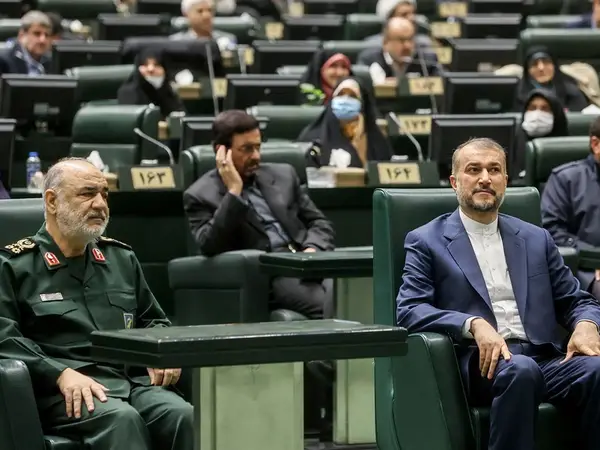The Islamic Republic of Iran upped the ante in its threats to Europe over the proposed listing of IRGC as a terrorist organization, being considered by the EU.
The parliament in Tehran held a special meeting Sunday with foreign minister Hossein Amir-Abdollahian and IRGC commander Hossein Salami attending.
After the meeting, parliament speaker Mohammad Bagher Ghalibaf (Qalibaf) issued a statement saying, “We will have actions on the agenda against European armed forces in the region.”
This clear threat comes as Iran and its proxy forces in Iraq and Syria have been targeting US military forces with missiles, rockets and mortars since 2019. These attacks were the immediate reason why in January 2020 former President Donald Trump ordered the killing of Qassem Soleimani, IRGC’s commander for extra-territorial operations.
Ghalibaf also declared that “This parliament is ready to designate European armed forces n the region as terrorist.” He added that if the IRGC is designated, “Europe will pay a full price for that.”
The issue of Europe listing the IRGC emerged in recent weeks as the Iranian regime has killed more than 500 people during popular protests that started in September, after the death of Mahsa Amini in hijab police custody.
Iranians launched a movement to ask European politicians to designate the IRGC as a terror group, as it was responsible for leading most of the security forces who killed, maimed and arrested protesters. The campaign was to an extent successful, bringing together European lawmakers from various groups and parties.
Last week, the European Parliament passed a resolution urging the Council of Europe to declare the Revolutionary Guard a terrorist organization.
It is by no means certain that the Europe will take this step, but some countries such as the United Kingdom might act.
The threats coming from the Iranian regime do have a deterrent purpose, but Iranian officials know there is little chance for the European Union to designate the Revolutionary Guard. If the EU simply announces partial sanctions on the IRGC, the regime can then claim victory that its threats worked.
One member of parliament Sunday made the highly questionable threat that the Islamic Republic can “limit navigation for European vessels” in the Persian Gulf’s Hormuz Strait. However, Iran has attacked foreign shipping in the region, using mines and drones, and has also boarded and impounded some tankers.
The political-ideological commissar of the IRGC also threatened energy shipments form the Persian Gulf, a threat Tehran officials including former presidents have made on some occasions.
Foreign minister Amir-Abdollahian tweeted after the parliamentary session that the Europe by passing the parliament resolution against the IRGC “shot itself in the foot.” He also did not rule out leaving the Nuclear Non-Proliferation Treaty (NPT) when asked by a reporter to say what Iran would do if the EU goes ahead with listing the IRGC.
In addition to the violent and deadly suppression of the protests, Tehran has been supplying kamikaze drones to Russia used in attacks on Ukrainian civilian targets. Many European politicians see this as an attack on Europe and together with United States have demanded Iran stop sending weapons to Russia.
With the serious deterioration in ties, it seems much less likely that the West would reopen nuclear talks with Tehran which were suspended last September after the US rejected what it said were extraneous demands by Tehran.
